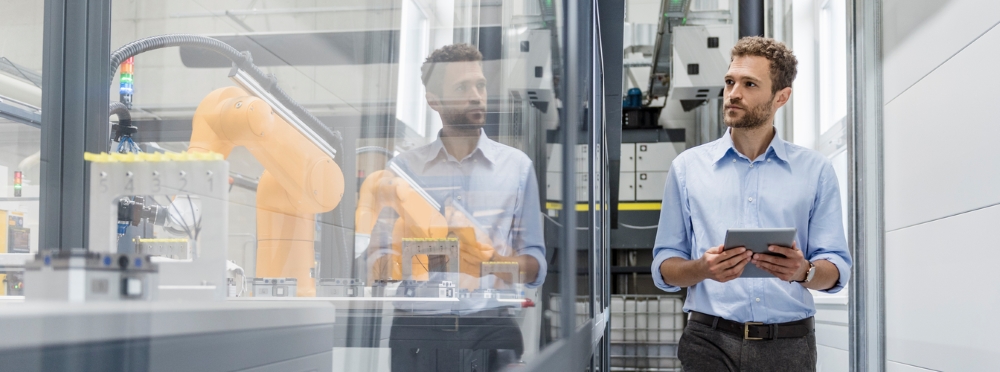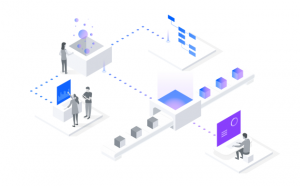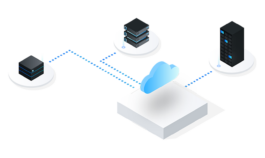The rise of intelligent automation
How the global pandemic has accelerated the digitization of the next generation supply chain

Within weeks of its emergence earlier this year, COVID-19 thoroughly disrupted the supply chain from end to end. Sudden and unpredictable changes in consumer demand, labour shortages, and export restrictions exposed vulnerabilities, bottlenecks and inefficiencies in traditional business processes across the supply/value chain.
Business continuity and stabilization were suddenly top priorities, but many enterprises found themselves bogged down by outdated business processes and were unprepared to rapidly pivot to digital engagement models and operations with their customers, suppliers and partners.
For suppliers and manufacturers, two key questions quickly emerged: How can we respond more quickly to supply chain disruption? And, where do we go from here?
Today, with industry watchers suggesting the disruption is likely permanent, there is an urgent need for intelligent, end-to-end workflow automation that is fully transparent for all stakeholders. I believe the acceleration of intelligent automation will play a starring role in the future of digital transformation by changing the way work gets done across the entire value chain. Static workflow must shift to dynamic, next-best actions – and this will re-balance what people, systems, and algorithms do.
A strategic priority for competitive advantage
With its promise of increased productivity, reduced costs, improved compliance and a streamlined back office through efficiency and scale, automation adoption has been steadily growing for years, and has become an integral part of the manufacturing process as well.
Before the pandemic struck with such unexpected force, most workflow automation was in the form of point solutions, with success measured by robotic process automation (RPA) on a specific task. Few enterprises felt any real urgency to move to intelligent automation of end-to-end processes.
As London School of Economics Professor Leslie Willcocks puts it, RPA “takes the robot out of the human” by handling repetitive business processes, thereby freeing humans to take on more productive tasks. Intelligent automation combines RPA, natural language processing, process management workflow software, and predictive analytics – all with a goal of increasing AI-driven decision making.
Recently, we have begun to see a widening scope of intelligent automation which represents the next generation for product and services differentiation across all industries. Driven by new technologies around intelligent workflows like IoT and Blockchain, intelligent automation manages business processes to transform how work gets done, and ultimately, will impact how the organization is structured.
At present, COVID-19 is accelerating the adoption of automation. Enterprises are making intelligent automation one of their key strategic priorities to be competitive and survive in the new economy. We are seeing a rapid move away from that narrow point automation of tasks to organization-wide digital transformation that can only be achieved by automation through intelligent workflows that are transparent and end to end.
Responding quickly in a world of rapid change
Intelligent automation of routine processes can create a better customer experience while empowering employees to do higher value work. On the operations side, the entire organization is always on, which optimizes the delivery of goods and services to provide seamless continuity in dynamic markets.
At IBM, our point of view is:
- Intelligent automation should span the end-to-end process, based on transparency and continuous learning.
- IBM’s intelligent workflows leverage the benefits of AI and automation across the entire lifecycle.
- Exceptions are handled by default through AI pattern recognition within the process itself to limit the human touchpoints, which improves the customer, employee, and supplier experience, and in parallel, lowers the overall operational costs.
- There is not a “one size fits all” technology playbook. An integrated platform will require design and alignment to the core business ecosystem.
- Digital workforce transformation is a critical component to achieve full business benefits and creates seamless balance across human resources and “bots.”
The pandemic has clearly demonstrated that businesses must be able to respond quickly in a new world of rapid change and uncertainty. Manual, repetitive, and non-integrated processes make it nearly impossible to take advantage of emerging innovations like Industry 4.0, Blockchain and 5G for the next chapter of digital reinvention. According to a global survey by Forrester, intelligent automation is the foundation for large-scale digital transformation.
Intelligent automation and AI represent the next generation for product and services differentiation across all industries, driven by new technologies around intelligent workflow. I believe it will dominate the next phase of hybrid multicloud – a $1.2 trillion market opportunity – because intelligent automation can help manage the inherent complexity of hybrid multicloud by putting the right workloads in the right place, controlling costs, and managing security effectively.

Setting the stage for digital transformation
At IBM, we see intelligent automation as a comprehensive solution capable of end-to-end business transformation – with benefits across the spectrum. IBM commissioned Forrester Consulting to examine the potential ROI of a customer who had implemented an IBM intelligent platform, and their financial analysis found that the organization experienced an ROI of 675%.
Clearly, there are financial benefits to automation – but that’s not all. intelligent automation and straight-through processing are propelling companies towards reengineered and optimized processes that are leading to:
- Changes in how work gets done, freeing critical resources and employees to focus on higher value work items.
- Higher revenue, lower costs, and improved customer and employee experience.
- Optimization of the delivery of goods and services for seamless continuity in fast-changing markets.
I believe IBM is the only organization with the business domain expertise with component models across industries, automation services, and hybrid cloud to deliver on the promise of intelligent automation and AI across industries. Our specialized consultants help clients close the gaps through an intelligent automation transformation that can make all the difference for their business.
Changing the future of work
More than any other factor, I believe that intelligent automation will be a defining factor for the future workforce. Adding intelligence to automation opens a new world of possibilities that can profoundly impact the way organizations operate and the way work gets done.
From consumer-facing enterprises and manufacturing to public sector, automation is changing the structure of work in nearly every industry.
Currently, my team at IBM Canada is engaged with several industry customers who are accelerating and adopting intelligent automation and benefiting from value chain efficiencies:
- Government: Eliminating legacy processes and moving entirely to digital transactions
- Financial Industry: Digital client onboarding, product fulfillment and fraud prevention
- Retail: Enhanced Customer Experience, emphasis on value chain using advanced technologies like Blockchain, Inventory Management and Tracing
- Travel and Transportation: Smart ticketing systems and IoT are driving processes improvements for fleet and logistics movements, including real-time visibility and decision-making, risk mitigation and increased trust
Post-COVID, senior operating executives will judge the success of their automation journey not only by how it improves speed to market, supply network efficiency, and overall customer experience, but how it lays the foundation for a comprehensive means to capitalize on artificial intelligence (AI) and ultimately enable innovation within the organization.
In my next blog, I’ll be conducting a Q&A with one of our clients where we will talk about how they are accelerating the journey to intelligent automation – and how it is driving new efficiencies and value. Stay tuned!

Daniel Cascone
Managing Partner, Cognitive Process Transformation, IBM Canada
Read COVID-19 and shattered supply chains
View highlights from Think 2020 about Automation
Watch the animated short Unlock Enterprise Potential with IBM Automation


